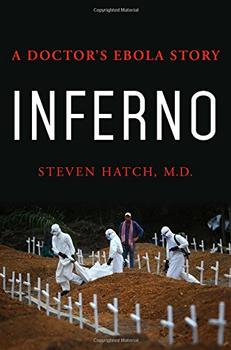Summary | Excerpt | Reviews | Beyond the book | Read-Alikes | Genres & Themes | Author Bio

From the book jacket:
In an astounding debut, Spanogle takes us on an
all-too-real race against time…as a young doctor
enters the dark side of scientific research,
desperate to stop a terrifying epidemic before
it is too late…
In Baltimore's St. Raphael's Hospital, three
newly admitted patients are among society's most
helpless citizens: female residents of
Baltimore's group homes for the mentally
impaired, their bodies racked by a virus the
likes of which no one at St. Raphael's has ever
seen.
Dr. Nathaniel McCormick is one of the first on
the scene. A young investigator from the Centers
for Disease Control (CDC), Nate is paid to
explore the bizarre, the exotic, and the
baffling–from superviruses to bioterrorism. But
as soon as Nate begins to investigate the lives
and habits of the victims, he knows something is
terribly wrong. Using all his skills as a
medical detective, Nate soon zeroes in on the
"vector" – the one person who had sexual contact
with the first victims. And when that suspect is
found murdered, Nate fears that the disease he's
chasing may not be an act of nature, but of man.
Comment: Joshua Spanogle is
currently a student at Stanford Medical School.
Most medical students graduate with a 4-year
medical degree in five years having taken a year
to do research, but Spanogle is set to graduate
in six. He spent his first additional year
doing basic science research and orthopedic
surgery; he's currently taking a second
year in order to write his second novel (Flawless,
due out in August).
More about Spanogle.
He wrote Isolation Ward, his first
novel, in the summer between his first and
second years, and spent the following 18 months
editing it in spare moments. It's set
firmly within the medical thriller genre as
defined by Robin Cook, with noir overtones (Spanogle
cites Raymond Chandler, Dashiell Hammett
and Raymond Carver as major influences).
The action moves at fever pitch, with
beautiful women, a really, really nasty villain,
lots of medical lingo and liberal amounts of
gratuitous violence from which our protagonist
recovers with miraculous speed.
Having said that, there is more to Isolation
Ward than many "page turners".
Spanogle's protagonist, Dr
Nate McCormick, is a flawed, misanthropic
character with a shameful past, which
together with the wide canvas of opportunities
open to him as a member of the CDC gives the
series the potential to run through many books!
In this opening book he's launched into the
middle of a controversial plot rooted in the
often substandard care of the mentally impaired; a story which is
inspired by some real life events and Spanogle's
own concern for society's most
vulnerable - "At times, we dehumanize
those with mental disabilities, and I wanted to
present them as fully as I could --- with
different needs and wants and, yes, sex lives."
Without giving away any plot spoilers, according to Spanogle, the
group home is inspired by newspaper reports of a
Baltimore institution; the idea of using patients in a persistent vegetative state
as they are used in the book was proposed in a
public forum by a surgeon; and the risks and
rewards of xenotransplantation (transplanting
cells, tissue or organs from one species to
another) are all based on fact.
One of Spanogle's stated intentions is to educate as
well as entertain so he has set out to make the science challenging but without going on ad nauseum - "Readers are very smart
and discerning, and my responsibility to them is
to present the science truthfully and
rigorously, at least in a general sense."
As Publishers Weekly puts it, "medical
thrillers have been rather sickly of late" -
which is why it's particularly exciting to
discover this "engrossing and intellectually
wrought first novel".
![]() This review was originally published in The BookBrowse Review in March 2006, and has been updated for the
January 2007 edition.
Click here to go to this issue.
This review was originally published in The BookBrowse Review in March 2006, and has been updated for the
January 2007 edition.
Click here to go to this issue.

If you liked Isolation Ward, try these:

by Steven Hatch
Published 2017
A physician's memoir about the ravages of a terrible disease and the small hospital that fought to contain it, Inferno is also an explanation of the science and biology of Ebola: how it is transmitted and spreads with such ferocity.

by Carla Buckley
Published 2011
How far would you go to protect your family?
Carla Buckley’s poignant debut raises important questions to which there are no easy answers, in an emotionally riveting tale of one family facing unimaginable stress.
Your guide toexceptional books
BookBrowse seeks out and recommends the best in contemporary fiction and nonfiction—books that not only engage and entertain but also deepen our understanding of ourselves and the world around us.